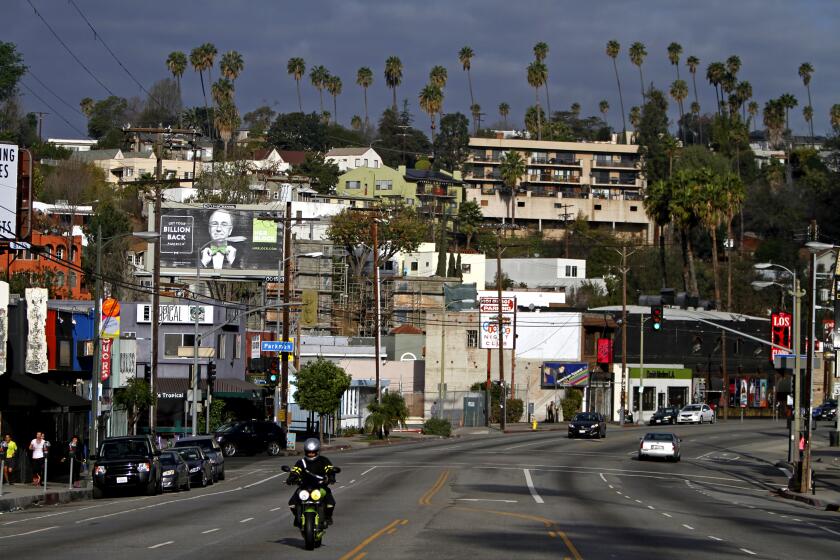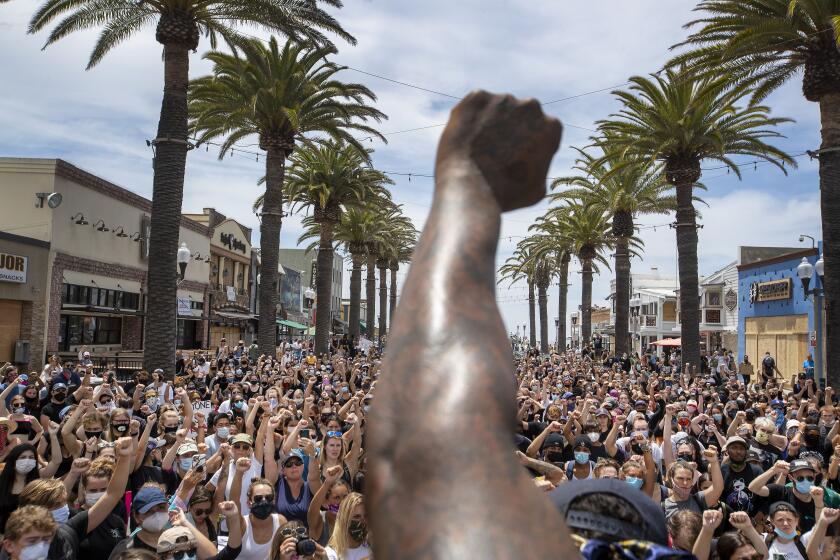Review: ‘Becoming Los Angeles’ nails the city in ways big and small, as only D.J. Waldie can
If you buy books linked on our site, The Times may earn a commission from Bookshop.org, whose fees support independent bookstores.
It’s so easy to write very badly about Los Angeles. Just ask the New York Times, or consult the work of any number of day-tripping feature writers, novelists and memoirists. The list of essential books that get L.A. right is short but it definitely includes D.J. Waldie’s classic 1992 memoir, “Holy Land.” Anchored in Lakewood, where Waldie is a lifelong resident and a city administrator, it was an artful and original cry of suburban pain. Nearly three decades later, he’s out with an essay collection, “Becoming Los Angeles,” which makes that short list of classics just a little bit longer.
“Holy Land’s” onslaught of short and muscular chapters — heavy with granular detail, philosophical musings, lacerating self-criticism and waves of fresh insights on one of L.A.’s less vaunted corners — still resonates today. “Becoming Los Angeles” is more tart and wise, what you might call an older man’s exhausted report on what’s still going wrong with our city. Any SoCal citizen should read both; what’s news is that the second one is just as bold and smart as his beloved debut, albeit in a different key.
“Holy Land” was acclaimed by many, including Joan Didion, for the mesmerizing energy of its set pieces. It shouldn’t be too surprising that “Becoming Los Angeles” is more measured, even jaded. Waldie is pretty brutal in assessing what his own or really any single human’s effort could possibly accomplish.
Christine Lennon, Su Wu and others contribute essays to a collection on the master essayist
“This is a book about a place Angelenos no longer live in,” Waldie writes in the preface, and in a way it does feel like a document of the past. Partly this is because Waldie started writing 10 years ago, before the latest waves of gentrification, followed of course by the twin detonations of COVID and Black Lives Matter. In the wake of all that, a book by a white guy was always going to feel ... not so urgent. And yet, though Waldie’s got his eye on the rear-view mirror, he’s angling it in many fresh and welcome directions.
Part of Waldie’s successful formula is to balance sweeping historical sketches with little pocket stories, sometimes composite, always clever, bringing even familiar events to brighter life. For instance, he has a sustained riff, much funnier than it has to be, on the fuzzy origins of California’s U.S. annexation: the signing of a “treaty/capitulation” on a “rainy/not so rainy Wednesday” that “made California suddenly American.”
He’s also deft on another key historical moment: the enormous and unwanted success of Helen Hunt Jackson’s novel “Ramona,” a love story set on one of California’s mythical “ranches,” whose exploitative labor practices Jackson had hoped to expose. Written in the spirit of advancing social justice, akin to “Uncle Tom’s Cabin,” it was instead devoured as a torrid romance, a kind of “Twilight” of its time. Again, this might be trodden ground, but few writers are so casually erudite that they can enhance the tale with an illuminating reference to the collapse of the cattle economy in the 1860s. I’ve read dozens of books on the region, and this episode was news to me.
Waldie’s more contemporary set pieces are also very good, almost as if the British naturalist Robert Macfarlane had been transported to Los Angeles and inoculated against the reductiveness that tends to infect its non-native chroniclers. Observe downtown L.A.’s button lady, with her endless drawers holding the solution to any sartorial problem. Or the rosary Waldie comes across in front of a police station. Or the time a hose left on too long reveals the ancient names scratched into a square of concrete the author has traversed every morning and evening for decades. (As was true in 1992, the author still lives in the house he was born in.)
A New York Times reporter who covers online culture is relocating to Los Angeles, and she needs your advice.
Waldie’s true power lies in these small, more intimate moments. Consider the way he writes about a man he sees repeatedly on Clark Avenue — first with a phone and laptop and nice bag, later just with the bag, then just with a sleeping bag and cart, and finally with nothing but what he’s wearing. “I don’t know what the young man who sleeps on Clark Avenue wants,” Waldie writes. “I know he didn’t want to become homeless and to have nothing.”
There are also a number of irresistibly munchable facts: The LAPD flies 19 helicopters, the nation’s largest municipal fleet, launched from a downtown roof — the world’s largest rooftop airport; Hollywood’s fake snow was made of a “sprayable mixture of fire extinguisher foam, sugar and corn flakes”; by 1935, L.A. was second only to Akron, Ohio, in tire production and outgunned only by Detroit in auto assembly.
It’s not a huge crew, those who’ve taken up the challenge of writing solid and important histories, personal and public, about this strange place so many of us call home. Because Waldie’s breadth of knowledge is so vast, his opinions so sharp and his loyalty so deep, he is especially articulate about what we have lost. You can almost hear Waldie sigh with frustration over the demolition, for no good reason, of a Spanish Revival home in Brentwood.
This is a writer with an ear for the strange or majestic but also the tiny detail that scolds, inspires or clarifies. As a city bureaucrat, Waldie has a realistic sense of how a city works. But as an urban poet, he also has the desire to assemble the nuts and bolts into a thing of beauty. His lament at the end of this book is almost a kind of howl, facing fully forward with apprehension but great clarity. “Before no longer exists,” he writes. “Now is the season of change. After is almost on us. Pray for Los Angeles.”
Walter Mosley, Luis Rodriguez, the coiner of #BlackLivesMatter and others sketch a hopeful future for L.A. and the U.S. after George Floyd protests.
Deuel is the author of “Friday Was the Bomb: Five Years in the Middle East.”
Becoming Los Angeles
By D.J. Waldie
Angel City Press: 232 pp, $30
More to Read
Sign up for our Book Club newsletter
Get the latest news, events and more from the Los Angeles Times Book Club, and help us get L.A. reading and talking.
You may occasionally receive promotional content from the Los Angeles Times.









